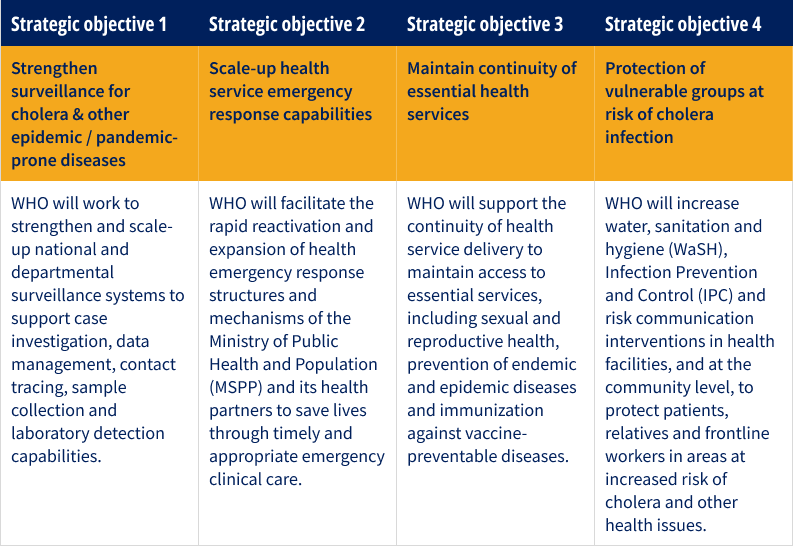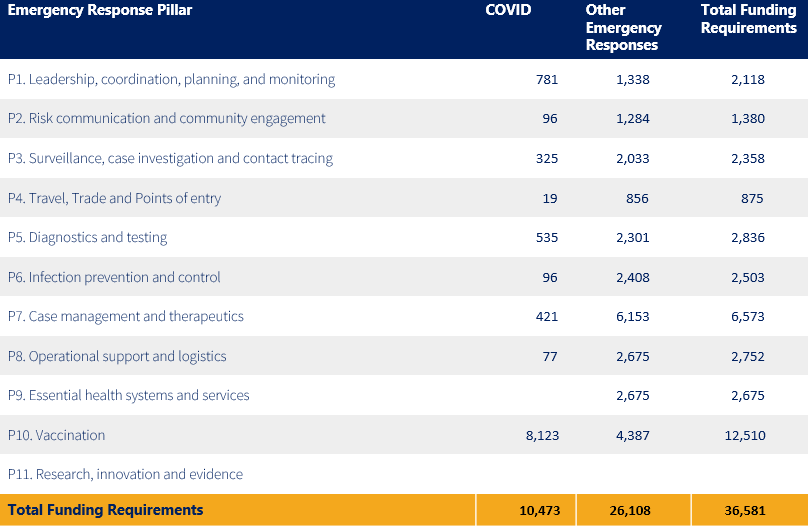
Haiti
Haiti
- People in need: 5.2 million1
- People targeted: 3 million
- Requirements (US$): 36.6 million
Context
For several years, Haiti has been engulfed in a socioeconomic, political and humanitarian crisis. The situation reached critical levels in mid-September 2022 following the intensification of gang violence and social unrest. Combined with political instability, this widespread insecurity has paralyzed the country, resulting in drastic consequences for access to basic goods and services, including food, water and health. The current fuel supply crisis has affected the supply of water and electricity to the population, health centers and hospitals. Due to problems of insecurity and violence, patients and health personnel have difficulty accessing hospitals and health services. In parallel, the public health system and international partners are faced with limited response capacity due to a reduction of international personnel in Haiti, combined with logistical issues and difficulties concerning the import of supplies.
Insecurity, roadblocks and lockdowns are affecting the import of internationally procured goods, which may slow the arrival of lifesaving essential supplies to support cholera response efforts in particular. This is a concerning scenario as cholera recently resurfaced in early October. Armed gangs now control over 60% of the metropolitan area of Port-au-Prince, affecting at least 1.5 million people. They have also expanded their influence outside of the capital city, causing disruption to key humanitarian programs in most of the national territory, including COVID-19 vaccination campaigns. The national road to the south has been blocked since June 2021, cutting off around three million people in the southern peninsula. This has affected response and recovery efforts following the severe earthquake that affected southern departments in August 2021. At the same time, the country experienced a third consecutive year of recession, with an inflation rate that reached 30% in July 2022. Food prices have increased by 63% over a year and international inflation on fuel and gas has further increased the price of imported goods.
According to the most recent Humanitarian Response Plan (HRP 2022), nearly half of Haiti’s population is facing high levels of acute food insecurity – a figure that has doubled in the last four years. Civil and political unrest, chronic poverty, natural disasters and COVID-19 are considered the main drivers of food insecurity. In this volatile socio-economic context, the government’s decision to scrap expensive oil subsidies set off massive and sometimes violent nationwide protests and blockades. In addition, the fuel shortage, exacerbated by the rise in international oil prices in early 2022 and resulting in the blockade of the oil terminal at Varreux by armed gangs from mid-September, is seriously disrupting water distribution, power supply and telecommunications and causing hospitals to shut down critical services.
The resurgence of cholera in early October, after over three years with no confirmed cases in Haiti, occurs against an extremely challenging backdrop of restricted humanitarian access to the population and severely deteriorating living conditions where over two-thirds of the population have no, or limited, access to basic drinking water and sanitation. Despite initial pledges by the international community, improved access to potable water, sanitation and hygiene (WASH) has been marginal since 2010. From 2010 to 2020, the proportion of the Haitian population with access to basic drinking water services increased from 62.2% to 66.7% and sanitation services from 27.2% to 37.1%. Currently, electricity power supply problems, fuel shortages and movement restrictions affect the population's access to water, which exacerbates the already precarious situation many Haitians face, increasing their risk factors for cholera infection. Malnutrition was already present in areas affected by violence and is set to worsen, further increasing vulnerability and risk of severe cases of cholera, especially among children.
Emergency response
WHO’s humanitarian priorities for 2023 in Haiti will focus on saving lives and addressing the immediate needs of the population in areas affected by the resurgence of cholera, as well as protecting the most vulnerable groups impacted by violence, insecurity and rising poverty levels. Response efforts will focus on supporting, expanding and strengthening the response capabilities of the Ministry of Public Health and Population (MSPP) and its health partners already operational on the ground, in order to manage and control cholera outbreaks (reducing mortality and morbidity) and limit its spread to other communities, departments and countries. Efforts will also be directed at supporting and sustaining essential preventative and curative health programs at the primary care level to avoid excess morbidity and mortality from preventable causes, primarily targeting individuals in vulnerable situations and those most disproportionately affected by the ongoing complex crisis.
Crucial support is needed to expand the lifesaving care delivery capacity of health institutions and partners providing cholera treatment services to the affected population, as well as keeping essential services operational, including maternal and neonatal care and emergency services. Strong efforts are being made by all health partners to rapidly ramp up care delivery capacities throughout the country to avoid the loss of life and preventable mortality. WHO will focus on ramping up capabilities for early detection and confirmation of cholera cases and the timely and adequate clinical management of cholera patients. Activities will also aim to address disruptions to essential health services caused by multiple simultaneous crises, through the provision of critical medical supplies and equipment, fuel, human resources and the deployment of emergency medical teams to assist saturated and overstretched health services.
As cholera prevention and treatment requires a multi-sectoral approach, incorporating public health actions as well as water, sanitation and environmental health interventions, complementary and coordinated intervention will be carried out within and across sectors. The current context of violence and insecurity, as well as limited access to health services, means community-based strategies are particularly important to protect families and support timely access to care. WHO will continue its efforts to engage and empower community members to support preventive and control measures and protect at-risk individuals through sensitization and risk communication actions.
Strategic Objectives


Key activities
- Control and limit the spread of cholera to wider communities and departments to help prevent morbidity and mortality.
- Procure lifesaving essential medicines and health supplies for cholera case detection, confirmation and treatment.
- Facilitate the establishment and operation of cholera treatment centers in or near affected communities, monitoring availability and occupancy rates of cholera beds, supporting effective referral of severe cases and disseminating protocols for cholera case management.
- Establish and strengthen community-based surveillance systems, training and increasing available human resources to support the national and departmental surveillance system. This will include case investigation, data management, contact tracing, community response activities and sample collection.
- Procurement of essential water, sanitation and hygiene (WaSH) supplies and the implementation of Infection Prevention and Control (IPC) measures in cholera treatment facilities to ensure appropriate practices are in place.
- Address acute health and humanitarian needs including severe malnutrition, recuperation of care delivery capacity in areas impacted by the 2021 earthquake.
- Promote vaccination against COVID-19 (only 2.1% of the population has completed a full two-dose vaccination series as of 15 November 2022) and other vaccine-preventable, epidemic-prone, diseases such as polio and measles, to prevent future outbreaks.
Funding requirements
Overall country funding requirements, including COVID-19, by pillar (US$ ‘000)


Success stories
COVID-19: increasing vaccination coverage in Haiti through community outreach
More than a year after the first doses arrived, Haiti still has one of the lowest COVID-19 vaccination coverage rates in the world. Only 2% of the population are fully vaccinated, despite efforts to make COVID-19 vaccines freely available to all.
Ongoing political and social unrest, widespread security threats, logistical challenges, an earthquake and reported high levels of hesitancy around the vaccine, severely hindered the Ministry of Public Health and Population (MSPP) from achieving its immunization goals. The National Coordination Unit of the Ministry’s Expanded Program on Immunization (EPI) launched a new initiative in June 2022 to intensify vaccination operations against COVID-19, focusing on risk communication and community engagement as key strategies to overcome information and perception barriers and increase vaccine uptake across Haiti.
"The success of this new phase of the COVID-19 immunization campaign is based on outreach work made possible by the Agents de Santé Communautaires Polyvalents (Community Health Workers) who go door-to-door to mobilize the population to get vaccinated," explains Kadebe Blam, a PAHO/WHO consultant.
In each department of the country, advocacy meetings have been organized to inform religious leaders, representatives of administrative and political bodies and media associations on the benefits of the COVID-19 vaccine and garner their support during vaccination efforts so people know that vaccines are safe and effective. Provisional vaccination data collected in the six departments of the country show that the number of people who received at least one dose of vaccine has risen from 248 000 to almost 400 000 since the start of a new phase of the vaccination campaign up until 19 October 2022. PAHO/WHO will continue to provide support to Haiti to facilitate the storage and handling of COVID-19 vaccines by strengthening the country’s cold chain capacity.
For more information
Chantal Calvel | Health Emergencies Advisor | PAHO/WHO Haiti | calvelch@paho.org

